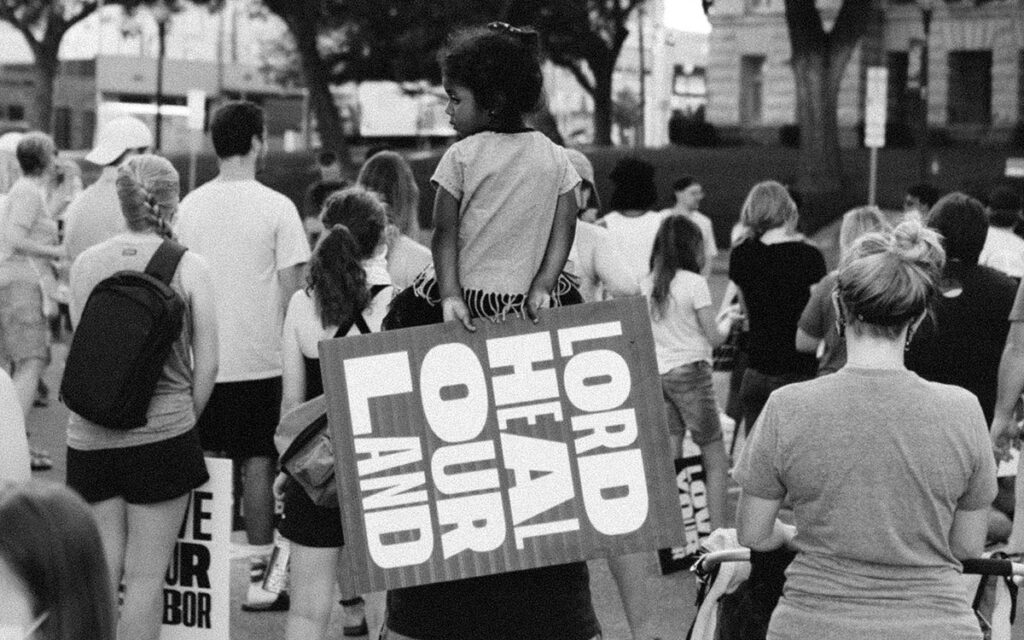
Across the globe, faith-based communities and movements are bridging faith with climate science, slowly leading the way to involving more people in global climate action. Here’s how leaders in the Islamic, Christian, and Jewish religions are working to encourage environmental action by returning to their faith’s original principles.
Connecting Islam and Climate Science
In 2004, following the deadly tsunami that killed over 230,000 people, the World Wildlife Fund invited environmental expert Nana Firman to Indonesia to help impacted communities rebuild. While Firman initially devoted the brunt of her efforts to involving the community in coastal rehabilitation efforts, such as replanting coastal mangroves to mitigate damage that future natural disasters could cause, she quickly realized that community members were more focused on rebuilding their lives.
One of the main reasons she struggled to connect with impacted communities was because much of the climate science she approached communities with was either alien or untranslatable into local languages. “For a year, I felt like I was speaking a different language,” Firman said. Finally, a friend recommended she try to connect to impacted communities through their faith—Islam.
That’s all it took for the local community to embrace what Firman was trying to do, and her relationship with impacted communities deepened. “The mission was meant to be four months. I ended up staying there for four years,” said Firman. She sought to understand how Islam’s original beliefs were rooted in environmentalism. For example, according to Islamic principles, all animals and living things, both human and non-human, have equal rights. Firman used these principles to connect with local communities around the importance of rehabilitation efforts to help strengthen their overall resilience against natural disasters caused by climate change. Her experience shows that using faith-based approaches to build connections can often be more effective than approaching communities with rigid science.
Armed with the lessons learned in Indonesia, Firman moved to the US in 2012 and began working with Muslim-American communities. She soon founded the Eco Hijrah concept, which draws from the Hijrah (migration) that the Prophet Muhammed undertook from Mecca to Medina (now cities in present day Saudi Arabia) to escape persecution. Eco Hijrah asks Muslims to emulate the prophet’s action by leaving behind unsustainable habits and making a Hijrah, or migration, to a greener lifestyle. Firman has also gotten involved with projects in local mosques and the Islamic society of North America to install greener wudu (pre-prayer washing ritual) stations and switch to renewable energy.
Firman isn’t the only one who’s experienced the power of connecting with people through the Islamic faith. EcoSikh is a faith-based climate-action organization that pulls upon Baba Nanak’s (the founder of Sikhism) main belief that “Air is the Guru, Water the Father, and the Earth is the Great Mother” to combat the most important environmental issues facing Sikhs in India and abroad today. Since 2009, EcoSikh has planted more than 303 micro forests across India. Other organizations, like Green Faith and Green Muslim, use Islamic faith-based principles to engage communities on climate action. For example, Green Muslim started hosting zero-waste community iftars (a special sunset meal) at local mosques during Ramadan. Most recently, the organization branched into hosting hiking events and engaging local Muslim groups in discussions around what Islam says about protecting the environment.
Sign up for our free newsletters
Subscribe to NPQ's newsletters to have our top stories delivered directly to your inbox.
By signing up, you agree to our privacy policy and terms of use, and to receive messages from NPQ and our partners.
How Christianity Has Moved the Climate Conversation
In 2015, the Vatican tried to connect faith and climate action when Pope Francis published his encyclical, “Laudato Si’: On Care for Our Common Home.” In what was deemed “The Francis Effect,” the pope helped to make the climate-change conversation global by drawing upon Christian language and morals to call people to action. In the months following its publication, the encyclical received expansive US news coverage, so much that Americans—especially those of Catholic faith—started to view taking action on climate change as a moral responsibility.
Climate scientist Carlos Martinez is also pulling on Christianity to close the gap between faith-based communities and climate scientists. In 2021, Martinez formed COSMOS, the Committee on Spirituality, Multi-faith Outreach, and Science, to challenge the commonly held belief that science and religion are mutually exclusive. COSMOS initiates communication between people of faith and climate scientists through informational webinars and collaborations. The committee works regularly with two entities—the Interfaith Power and Light Network and American Meteorological Society—which likewise seek to bridge faith and climate action. Martinez realized that his faith has become a crucial aspect of how he approaches climate-science work. He explains that “spiritual knowledge has practices that help us process climate grief. That helps us process disaster.”
Judaism and Environmentalism
A member of Kansas Inter Faith Action, Rabbi Moti Reiber teaches and abides by ethical principles enshrined in Jewish law that directly relate to the environment. Those include bal tashkhit (do not waste) and tza’ar baaley hayim (do not subject animals to unnecessary suffering). Reiber also teaches that the role of human beings is to help manage God’s creations. “This helps put into religious context concern for the way human activity is affecting God’s creation—such as causing atmospheric warming through the burning of fossil fuels,” says Reiber.
KIFA helps its members understand and engage with legislation and policy around climate. For example, some of KIFA’s 2023 legislative priorities include advancing clean energy in Kansas, addressing water issues in the western part of the state, and pushing dialogue that will move the state away from fossil fuels. Like COSMOS, KIFA also works with IPL to help its members reinforce their commitment to faith-based climate action.
Another climate focused organization is Dayenu: A Jewish Call to Climate Action. Established in 2020, this new multi-generational organization mobilizes the Jewish community through movement building, bold action and faith transformation. Members can take advantage of a range of opportunities including Dayenu circles which are local support hubs, workshops and organizing events which are all focused on finding solutions to the climate crisis.
At the heart of it, leaders like Firman, Reiber, and Martinez use faith to help advance climate justice and action. As the impacts of the approaches taken by faith-based movements grow, faith spaces can continue to serve as powerful mobilization centers for climate action.












